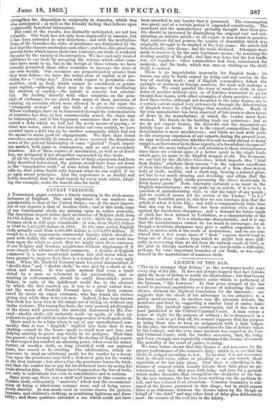LICENCE OF THE BAIL.
" Taunt is stranger than fiction," as the newspaper-reader says every day of his life. It does not always happen that fact follows upon the heels of fiction to verify its illustrations; but that favour has been conferred on the dramatic satire which is performed at the Lyceum, " The Lawyers." In that piece counsel at the bar resort to personal imputations as a means of defending their own
clients, without the slightest foundation for the innuendo : one suggests that the client of his adversary, is too attentive to a
pretty maid-servant ; in another case the advocate defends the murderer and thief by suggesting a similar kind of undue fami- liarity. The incident appears extravagant, but it has been at least paralleled in the Central Criminal Court. A man enters a house at night for the purpose of robbery ; he is discovered in a bedroom ; and to get him off, his counsel suggests that his purpose in being there was to keep an assignation with a lady lodger. In the play, the client earnestly repudiates the line of defence taken by his counsel, and the very same incident was copied in the Cen-
tral Criminal Court; with the further accessory, that, the Judge and Jury strongly and repeatedly condemned the licence of counseL The morality of the court of justice is rising. We have before shown that this licence is not necessary for the proper performance of the counsel's duty ; which is, to see that his client be judged according to law. To do that, it is not necessary that he should raise, either in pleading or on any record, those opprobria of the law false pleas. That there is something in the manner of counsel which usually defeats those falsepleas we are
convinced, and that they pass with judge and jury for a garnish which rather discredits than strengthens the eloquence of the bar.
In the new instance, the bar has been working out the problem it- self, and has reduced it ad absurdum. Common humanity is out, raged at the licence presented in this shape ; but in strict reason there is no difference between the licence taken by Mr. Sleigh on behalf of " his thief " and any other kind of false plea deliberately used : the essence of the evil lies in the falsity.


























 Previous page
Previous page